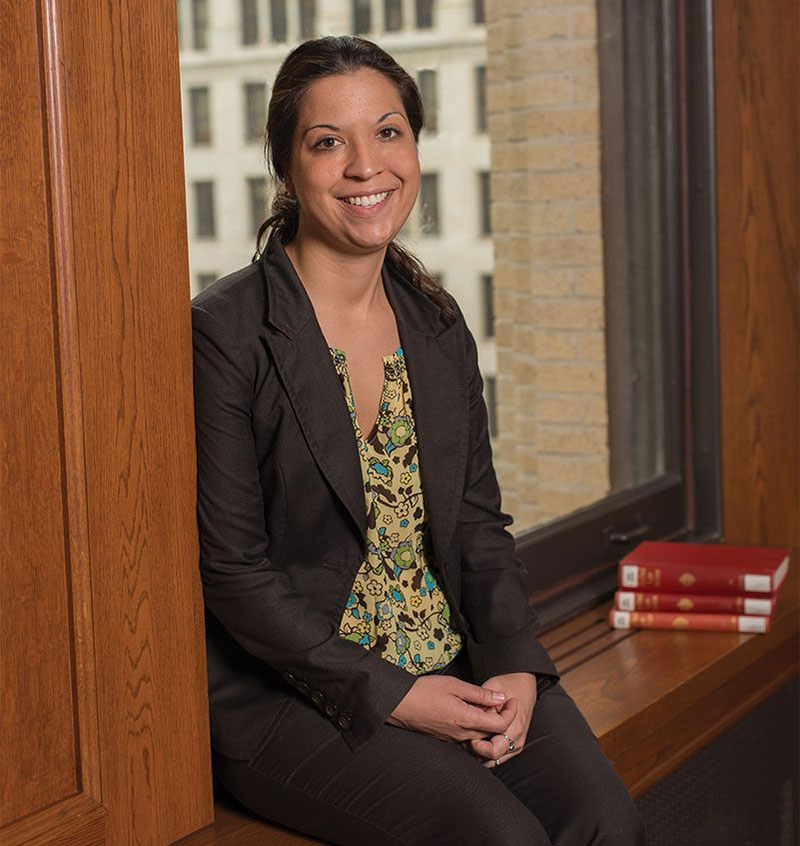
Rose Rivera (JD ’09) built the Center for Legal Justice from a model she’d been quietly hatching for years.
Rivera entered law school intending to eventually join a well-established nonprofit in Chicago, such as LAF (formerly the Legal Assistance Foundation of Metropolitan Chicago), and settle into the city.
When that didn’t pan out, she turned to a world of possibilities. She took the opportunity to move to Indiana and pursue her LL.M. in International Human Rights at Notre Dame. Rivera also tested the waters abroad, completing an internship at the International Criminal Court in Holland, but concluded that she wanted to work in the United States.
Deciding to stay in the area, at least temporarily, Rivera applied for a job as an immigration attorney at the Just Help: Elkhart County Legal Advocacy Center in Goshen, Indiana. She was hired in August 2010 and eventually promoted to executive director and lead attorney, inheriting 200 cases relating to family law. She spent three years with the organization at its Goshen location, during which she says she got a crash course in family law. When the center uprooted to Elkhart, Indiana, it served as the first legal immigration service in the South Bend area, aside from Catholic Charities. In Elkhart, a factory town with a large immigrant demographic, Rivera recognized a serious need for local immigration attorneys.
She revisited an old idea she had quietly considered while in college: opening up her own business. She began actively researching information, consulting friends and mentors on the topic until, in February 2013, the center unexpectedly announced its closure. Rivera took it as a sign to branch out on her own. “I was already thinking about the 200 clients they were going to drop,” she said. She met with other attorneys in the area who also agreed there was a need for nonprofit legal services in addition to what already existed.
“It just sort of came together,” Rivera said. She revised the bylaws and nonprofit application she’d developed while at Notre Dame and began scouting spaces to rent for her immigration-focused bilingual organization called Center for Legal Justice. Rivera received nonprofit status in March. “For the most part, the position felt like stepping into old boots,” Rivera said. The center focuses on family and immigration law, such as family-based applications for legal permanent residence, naturalization and citizenship, and works by providing services on a reduced fee scale. While some things changed, such as her professional liability insurance and bank, others remained.
The center’s board includes former Just Help staffers like paralegal Cynthia Murphy-Wardlow and Rivera’s former colleague Lindsay Davenport. Rivera said she still calls upon the mentors and friends who helped her through the process, such as Center for Public Interest Law Faculty Director Len Cavise, former Asylum & Immigration Law Clinic staff attorney Linus Chan, Allegra Cira Fischer (’09), Susan DeCostanza (’08) and Jenny Grobelski (’10). “I couldn’t handle half the cases I do without their input.” Aside from her entrepreneurial spirit, another thing that sets Rivera apart from her peers is her decision to work in a small, rural area.
“A lot of things about Elkhart are special,” said Rivera of the diverse town with a population around 50,000. “It’s a neat little place where everyone knows each other.” Taking her urban education to a smaller town gave her an edge that she recommends to other young graduates.
“It’s a great experience for a young attorney who wants to get their feet wet,” Rivera said. “You become very recognizable very quickly. Relationships mean a lot here, with colleagues, and with referrals from judges. On the one hand you have to work to solidify those relationships, but now I go into a local courthouse and everyone knows who I am and what the Center for Legal Justice is. In Chicago relationships can only take you so far.”
Rivera said her biggest challenge is balancing the need to give every client the attention they deserve, while earning enough income to keep the center running. “Once in a great while, clients run out of money, and we’ll take them on pro bono,” she said. “To be frank, I wasn’t sure that it would work out when we started. [However], the need is there, and people have enough income to pay something for the services and invest in some way financially.”
“We make it with a little more and more to spare,” she said. “It’s very rewarding.”
Article from the fall 2013 issue of Dialogue magazine.